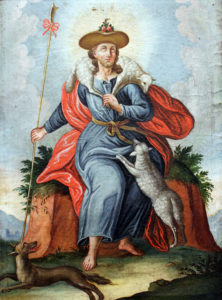Thoughts on Sunday’s Lessons for April 22, 2018

Christ as the Good Shepherd (1750), by an unknown artist from Lower Bavaria. Germanisches Nationalmuseum, Nuremberg. (Click image to enlarge.)
This Sunday, coincidentally falling on Earth Day this year, is called “Good Shepherd Sunday” for its focus on God’s protective love. In our first reading from Acts, we see Peter again, brave and bold with the power of the Holy Spirit. He and John have been arrested by the Temple authorities for healing a paralyzed man and preaching that the resurrected Jesus is the Messiah. Unafraid, he reminds them that they are the ones who crucified Jesus, whom God then raised from the dead and – quoting the Psalm 118 verses that we heard on Palm Sunday and Easter – made Jesus, the stone they had rejected, into the cornerstone of salvation.
Psalm: Psalm 23
When Christians read the beloved verses of the 23rd Psalm, we may well imagine the face of Jesus as the Good Shepherd who walks beside us through the valley of the shadow of death. Indeed, John’s Gospel shows us Jesus declaring himself the Good Shepherd in today’s Gospel reading. Originally, of course, the people sang this Psalm in thanksgiving and praise for God, who brought them out of exile and led them home, serving them a lavish banquet while their vanquished enemies could only look on.
Second Reading: 1 John 3:16-24
Jesus loved us so much that he laid down his life for us. This beloved idea from John’s Gospel – which we see reflected here in the first letter in John’s name – is just about as reassuring as the 23rd Psalm. But the rest of this reading becomes challenging when we hear that we are to lay down our lives for one another too. We must not refuse help to a brother or sister in need. In short, we are to be not only sheep, but shepherds, too. Filled with God’s love, we are called to be bold, just as Peter was bold, fired by the Holy Spirit just as Peter was inspired.
Gospel: John 10:11-18
If we step back and read this chapter of John its full context, this seemingly simple narrative intriguingly mirrors today’s reading in Acts. Much like the authorities confronting Peter and John in Acts over their healing and preaching, here the Pharisees are angry and alarmed because Jesus healed a blind man on the Sabbath, prompting people to speak of Jesus as the Messiah. Suddenly we realize that Jesus isn’t gently reassuring us by calling himself the Good Shepherd; he is pushing back hard against the Pharisees. If the people are harmless sheep, the Pharisees are the vicious wolves who prey upon them. Jesus declares that he will lay down his life for the sheep, and that he will live again.
